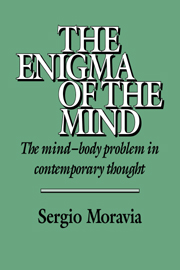Preface to the English edition
Published online by Cambridge University Press: 05 June 2012
Summary
I am pleased that Cambridge University Press has decided to present The Enigma of the Mind to the English-speaking world. In effect, the so-called mind–body problem (mbp), which constitutes the subject of my book, though naggingly present throughout the whole history of Western thought, has been investigated in our time principally in the United States, Australia, and Great Britain. That my approach to this “problem” has attracted the attention of various American colleagues is cause for considerable satisfaction. It is likely that one reason for this interest is simply the fact that the book offers a broad comparative overview of the main theoretical tendencies that have grappled with the mbp since the 1950s and 1960s. In this sense, the essay may serve as an introduction to one of the central issues of the contemporary philosophy of mind; one of the few, despite the extremely vast literature on the mbp published in English, to present the historical-theoretical overview I have attempted to give here.
Actually, my ambitions for the function and significance of this work are also of another nature, and it is my hope that the reader will grasp them (and find them legitimate) without great difficulty. In the first place, it has been my aim not to present an eclectic review of various attitudes toward the mbp but rather to show the logic which, at least from my philosophical perspective, has given a certain direction to the debate on the relationship between mind and body.
- Type
- Chapter
- Information
- The Enigma of the MindThe Mind-Body Problem in Contemporary Thought, pp. ix - xiiPublisher: Cambridge University PressPrint publication year: 1995



